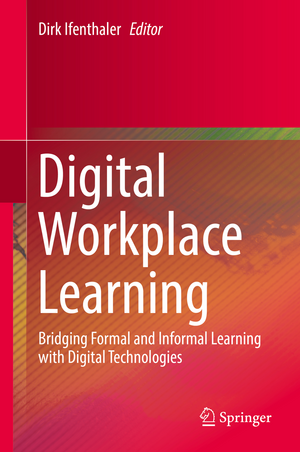Digital Workplace Learning: Bridging Formal and Informal Learning with Digital Technologies
Editat de Dirk Ifenthaleren Limba Engleză Hardback – 9 feb 2018
1. Current research exploring the theoretical underpinnings of digital workplace learning.
2. Insights into available digital technologies as well as organizational requirements for technology-enhanced learning in the workplace.
3. Issues and challenges for designing and implementing digital workplace learning as well as strategies for assessments of learning in the workplace.
4. Case studies, empirical research findings, and innovative examples from organizations which successfully adopted digital workplace learning.
| Toate formatele și edițiile | Preț | Express |
|---|---|---|
| Paperback (1) | 643.16 lei 6-8 săpt. | |
| Springer International Publishing – 4 iun 2019 | 643.16 lei 6-8 săpt. | |
| Hardback (1) | 898.75 lei 6-8 săpt. | |
| Springer International Publishing – 9 feb 2018 | 898.75 lei 6-8 săpt. |
Preț: 898.75 lei
Preț vechi: 1096.03 lei
-18% Nou
Puncte Express: 1348
Preț estimativ în valută:
171.98€ • 179.92$ • 142.86£
171.98€ • 179.92$ • 142.86£
Carte tipărită la comandă
Livrare economică 02-16 aprilie
Preluare comenzi: 021 569.72.76
Specificații
ISBN-13: 9783319462141
ISBN-10: 3319462148
Pagini: 325
Ilustrații: XXIV, 325 p. 29 illus., 24 illus. in color.
Dimensiuni: 155 x 235 x 21 mm
Greutate: 0.67 kg
Ediția:1st ed. 2018
Editura: Springer International Publishing
Colecția Springer
Locul publicării:Cham, Switzerland
ISBN-10: 3319462148
Pagini: 325
Ilustrații: XXIV, 325 p. 29 illus., 24 illus. in color.
Dimensiuni: 155 x 235 x 21 mm
Greutate: 0.67 kg
Ediția:1st ed. 2018
Editura: Springer International Publishing
Colecția Springer
Locul publicării:Cham, Switzerland
Cuprins
Part I. Theory of Digital Workplace Learning.- Chapter 1. Theory of Digital Workplace Learning.- Chapter 2.Encouraging metacognition in digital learning environments.- Chapter 3.A new work and learn framework.- Chapter 4.Supporting informal workplace learning through analytics.- Part II. Design, Implementation and Assessment for Digital Workplace Learning.- Chapter 5.Designing competence assessment in VET for a digital future.- Chapter 6.Designing flipped learning for digital workplace learning .- Chapter 7.Workplace learning, big data, and organizational readiness: where to start?.- Chapter 8.Combining learning analytics with job market intelligence to support Learning at the workplace.- Chapter 9.Massive Open Online Courses in digital workplace learning.- Chapter 10.Creatıng a MOOC portal for workplace learning.- Chapter 11.kfz4me.de – Design-based learning settings for vocational education and training.- Part III.Case Studies and Innovative Approaches.- Chapter 12.Can learning analytics find success in didactical measurements? Results from a MOOC case study.- Chapter 13.Digitalisation of work: Between affordances and constraints for learning at work.- Chapter 14.Visual technologies to bridge the gap between school and workplace in vocational education.- Chapter 15.Learning factories in vocational schools.- Chapter 16.Online onboarding: Library workplace training in a trilingual interactive online asynchronous environment.- Chapter 17.Hive-minded: Educators, professional learning networks and knowledge exchange in the digital age.
Notă biografică
Dirk Ifenthaler is Chair and Professor for Learning, Design and Technology in the Business School at the University of Mannheim, Germany and Adjunct Professor at Deakin University, Australia. His previous roles include Professor and Director, Centre for Research in Digital Learning at Deakin University, Australia, Manager of Applied Research and Learning Analytics at Open Universities Australia, Professor for Applied Teaching and Learning Research at the University of Potsdam, Germany. Dirk was a 2012 Fulbright Scholar-in-Residence at the Jeannine Rainbolt College of Education, at the University of Oklahoma, USA. Professor Ifenthaler’s research focuses on the intersection of cognitive psychology, educational technology, data analytics, and organizational learning. He developed automated and computer-based methodologies for the assessment, analysis, and feedback of graphical and natural language representations, as well as simulation and game environments for teacher education. His research outcomes include numerous co-authored books, book series, book chapters, journal articles, and international conference papers, as well as successful grant funding in Australia, Germany, and USA.
Textul de pe ultima copertă
This book aims to provide insight into how digital technologies may bridge and enhance formal and informal workplace learning. It features four major themes:
1. Current research exploring the theoretical underpinnings of digital workplace learning.
2. Insights into available digital technologies as well as organizational requirements for technology-enhanced learning in the workplace.
3. Issues and challenges for designing and implementing digital workplace learning as well as strategies for assessments of learning in the workplace.
4. Case studies, empirical research findings, and innovative examples from organizations which successfully adopted digital workplace learning.
1. Current research exploring the theoretical underpinnings of digital workplace learning.
2. Insights into available digital technologies as well as organizational requirements for technology-enhanced learning in the workplace.
3. Issues and challenges for designing and implementing digital workplace learning as well as strategies for assessments of learning in the workplace.
4. Case studies, empirical research findings, and innovative examples from organizations which successfully adopted digital workplace learning.
Caracteristici
Provides insights into how digital technologies enhance formal and informal workplace learning Offers design, implementation, and assessment strategies for digital workplace learning in organizations Includes case studies showing innovative approaches of digital workplace learning
